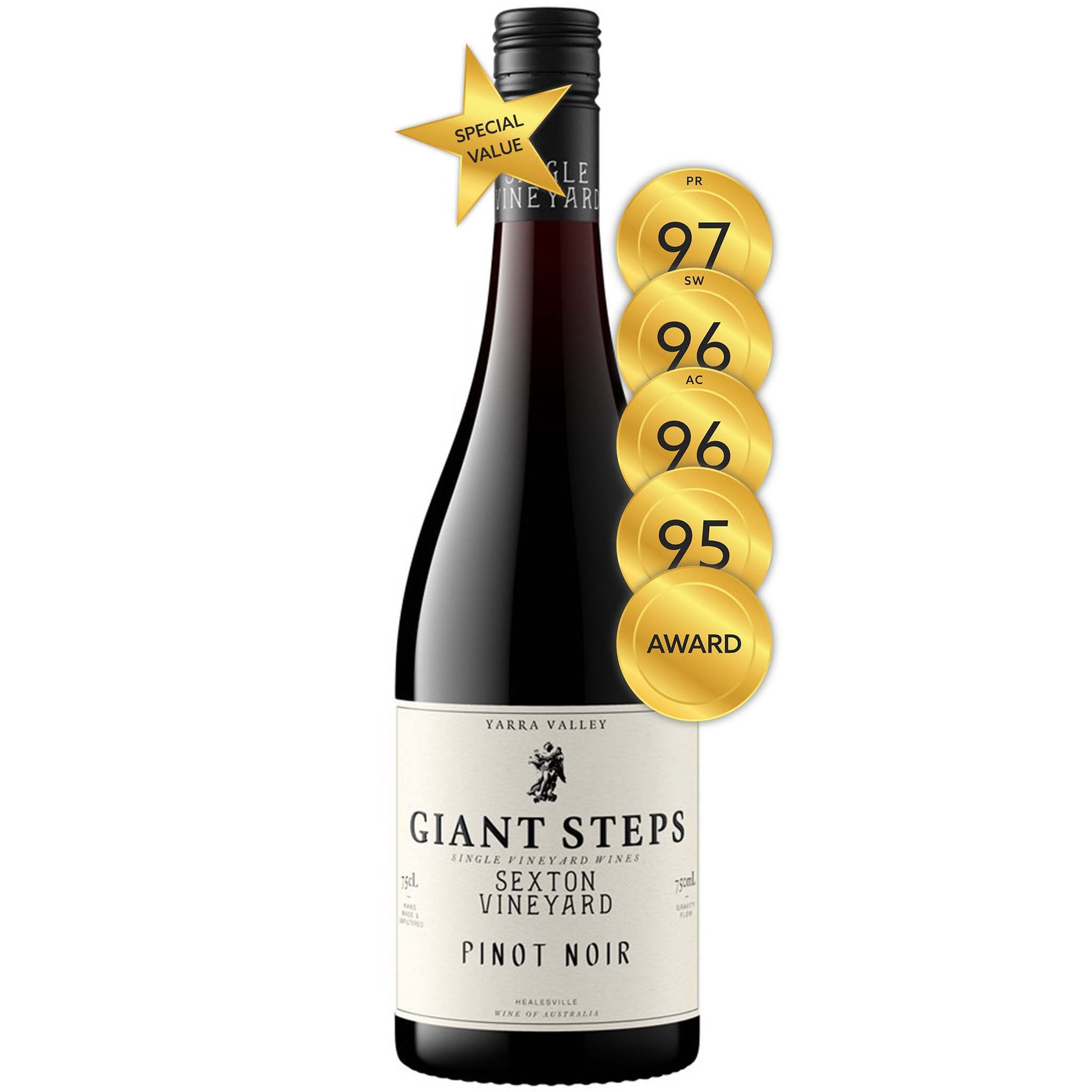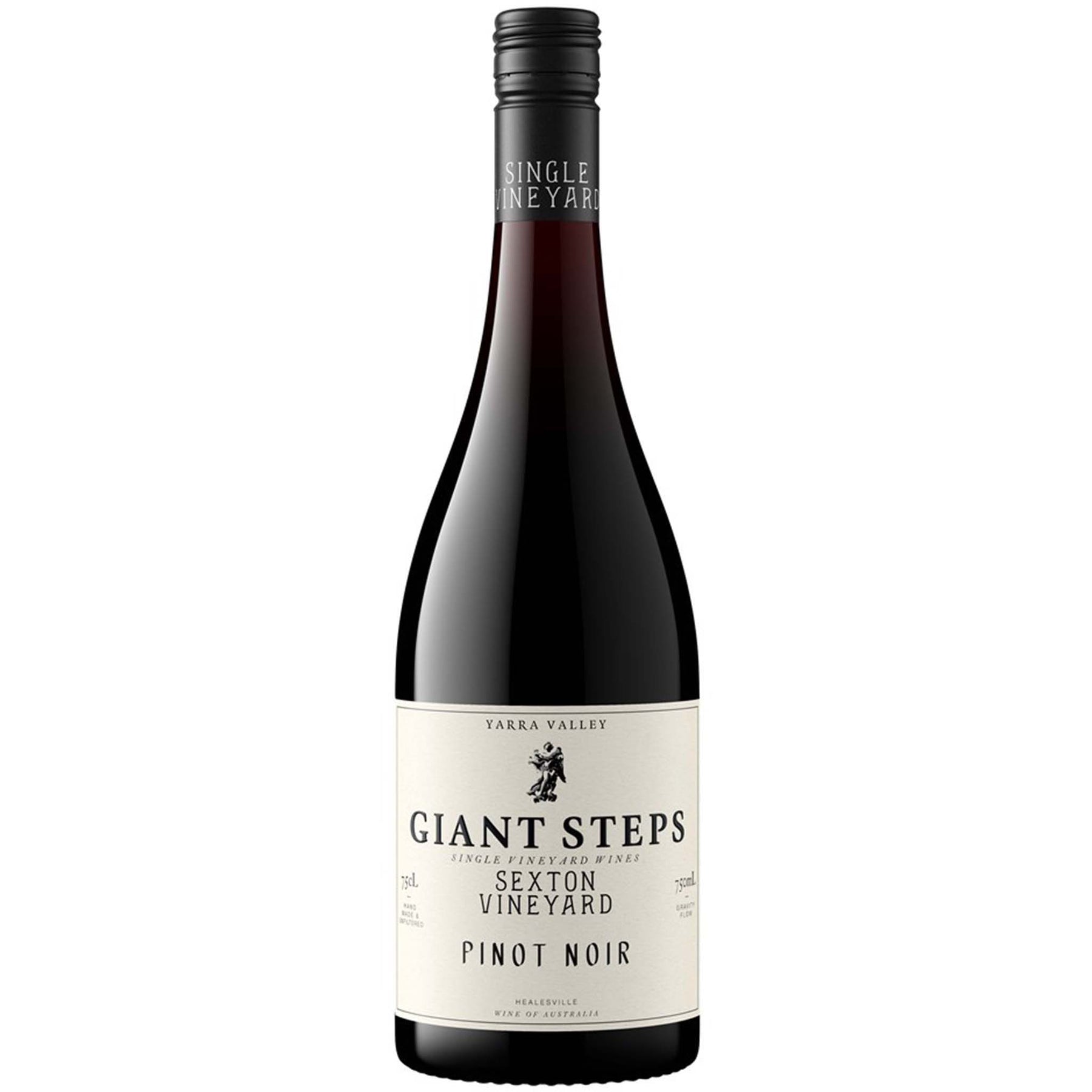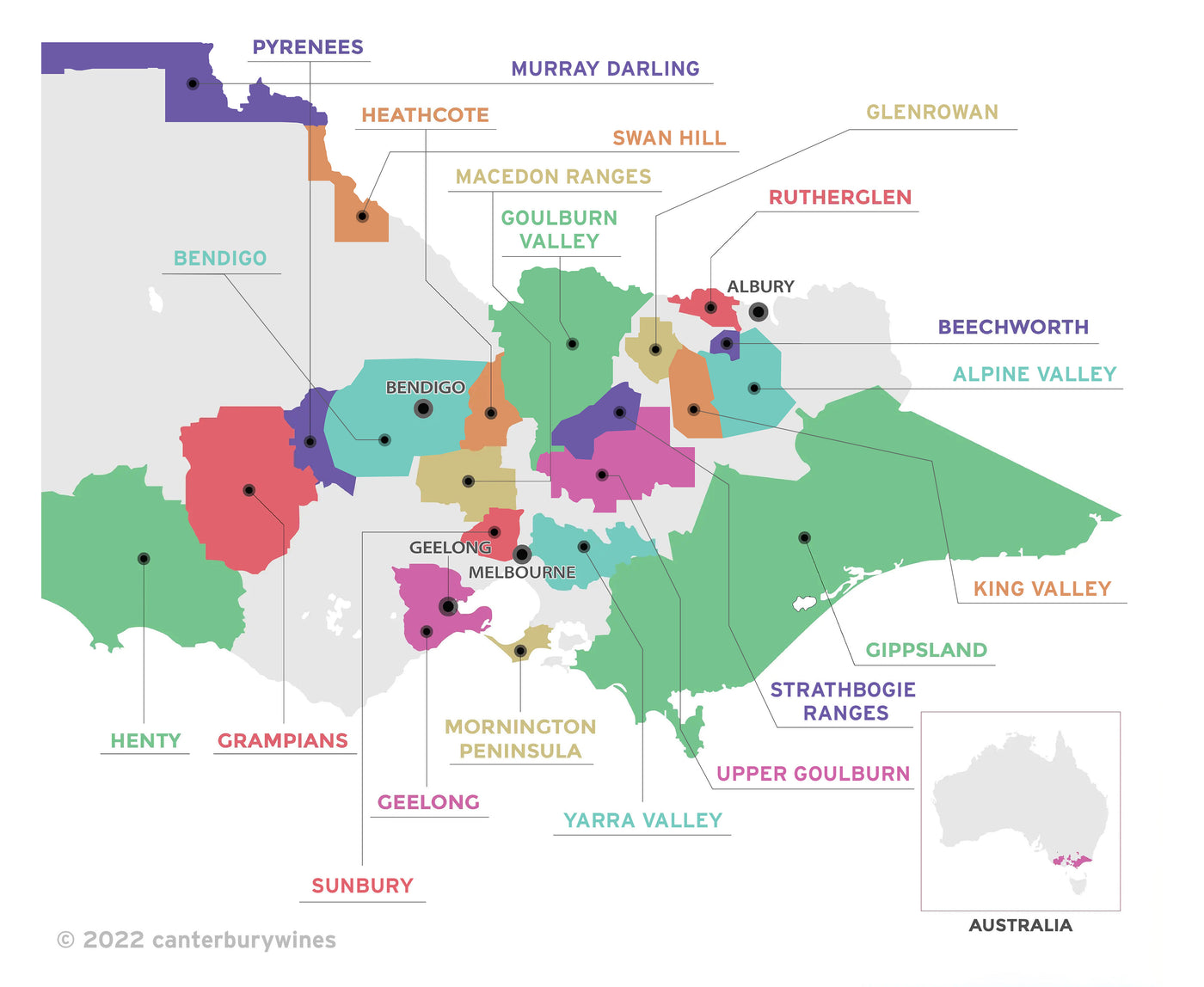

Giant Steps Sexton Vineyard Pinot Noir 2023
Style: Red Wine
Closure: Screwcap
Giant Steps Sexton Vineyard Pinot Noir 2023
Warehouse
34 Redland Drive
Vermont VIC 3133
Australia
Critic Score: 97
Alcohol: 13.5%
Size: 750 ml
Drink by: 2035
2024 Australian Pinot Noir Challenge, 2nd place and Yarra Valley Regional Winner
Giant Steps is recognized as a global benchmark for cool climate Chardonnay and Pinot Noir. The winery was established in 1998, one year after founder Phil Sexton arrived in the Yarra Valley in search of ideal sites to produce Chardonnay and Pinot Noir of purity and finesse. The Giant Steps Single Vineyard range is produced from the most site-expressive fruit off the best vineyards in great years.
"Intense strawberry glacé, black cherry, hint herb/ chinotto aromas. with marzipan/ vanilla notes. Beautifully concentrated and pure-fruited wine with plentiful strawberry pastille, dark cherry, touch cola flavours, fine al-dente/ chewy textures, underlying almond/ vanilla notes and fresh mineral acidity. Everything in beautiful balance. Super wine." Andrew Caillard MW
The Sexton Vineyard is located at Gruyere in the Lower Yarra Valley and was planted in 1997. The 30 hectare vineyard is at an elevation of 130-210 metres, has north facing slopes on grey clay soils and is planted to MV6, G5V15, POM5 and D clones.
"2023 was a small, high-quality vintage in the Yarra Valley. The grapes in 2023 had lovely fruit concentration with bright natural acidities. Handpicked, fermented in a combination of small oak fermenters and stainless-steel open vats. The MV6 parcels were fermented as whole bunches, while the remaining clones were destemmed to whole berries and cold soaked for four days before fermentation started. The resulting blend is 21% whole bunch fermented. All parcels were matured in French oak – 25% new, 75% seasoned – for 10 months in 225L barriques predominately Taransaud and Dargaud & Jaeglé. The wine was not moved and kept in contact with its lees before blending in December. Bottled by gravity. No fining. No filtration." Giant steps
Expert reviews
"From the Sexton vineyard in Gruyere; 10% whole bunches and matured nine months in French barriques (25% new). A deep ruby. Aromas of kirsch, damson plums, licorice root and spices; this heady, concentrated wine has a lot of meat on the bones, with ripe, persistent tannins boding well for the future. A great contrast to the more delicate Giant Steps wines such as Bastard Hill and Primavera. Drink by: 2030." Philip Rich, Halliday Wine Companion – 97 points and Special Value Wine ★
"The final blend of this wine is around 21% whole bunch fermented. A quiet wine in the glass that needs a bit of time before it reveals itself, be patient as this wine unfurls and gains momentum. It is deeply pigmented in garnet hues and shows black raspberries, cherries and rose petals. Woodsy herbs like rosemary stem, thyme, clove and sesame. Front to middle palate tannins are grainy and astute. There are granite-like immoveable foundations to this wine that will allow it to live a long time. So too is there significant turbidity and viscosity to this wine. Drink now or cellar for 8 years. A perfect wine for blackened skinned cod." Shanteh Wale, Winepilot - 96 Points
"Medium crimson. Intense strawberry glacé, black cherry, hint herb/ chinotto aromas. with marzipan/ vanilla notes. Beautifully concentrated and pure-fruited wine with plentiful strawberry pastille, dark cherry, touch cola flavours, fine al-dente/ chewy textures, underlying almond/ vanilla notes and fresh mineral acidity. Everything in beautiful balance. Super wine. Drink now – 2030." Andrew Caillard MW, The Vintage Journal - 96 points
"While the 2023 Bremley Pinot Noir from the Coal River came out on top, it was a tight competition for first place, with the Yarra Valley's 2023 Giant Steps Sexton Vineyard Pinot Noir an extremely close second, requiring lengthy deliberations from the judges to finalise the winner." 2024 Australian Pinot Noir Challenge - 95 points and 2nd place and Yarra Valley Regional Winner
Awards
Yarra Valley Regional Winner - 2024 Australian Pinot Noir Challenge
Special Value Wine – Halliday Wine Companion ★
 In 1997 Phil Sexton arrived in the Yarra Valley in search of ideal sites to produce Chardonnay and Pinot Noir of purity and finesse. He was looking for sites with altitude, aged soils, slopes of exposure, regular rainfall and cool to cold nighttime temperatures and a gentle breeze off the protecting mountain ranges. The Giant Steps winery was established one year later in 1998.
In 1997 Phil Sexton arrived in the Yarra Valley in search of ideal sites to produce Chardonnay and Pinot Noir of purity and finesse. He was looking for sites with altitude, aged soils, slopes of exposure, regular rainfall and cool to cold nighttime temperatures and a gentle breeze off the protecting mountain ranges. The Giant Steps winery was established one year later in 1998.
The focus is on the production of high-quality, single-vineyard wines. The Giant Steps Single Vineyard range is produced from the most site-expressive fruit off the best vineyards in great years. Each single vineyard wine tells a story about the vineyard, vintage and variety. Production of these wines is very limited with some vineyards producing as little as 200 cases.
The single vineyards comprise the Sexton Vineyard in the Lower Yarra and the Applejack and Bastard Hill Vineyards in the Upper Yarra (both owned by Giant Steps), the Tarraford Vineyard in the Lower Yarra under long-term lease, the Primavera Vineyard in the Upper Yarra under long-term supervised contract and, up until the 2023 vintage, the Wombat Creek Vineyard owned by Hand Picked Wines. In addition, Giant Steps produces a Yarra Valley range of wines made from handpicked fruit from their estate vineyards. They are highly expressive wines, true to the regional characteristics of the Yarra Valley.
The Giant Steps wines have received global acclaim and are now recognized as a global benchmark for cool climate Chardonnay and Pinot Noir. Since 2003 Giant Steps wines have been awarded 34 trophies and over 100 gold medals at major international and domestic wine shows and has been named one of the Top 100 Wineries in the World by US Wine & Spirits Magazine for each of the last six years.
Giant Step's success is due in no small part to Steve Flamsteed, Chief Winemaker since 2003. Steve had previously worked for Leeuwin Estate (1999 – 2002) and the Hardy Wine Company at their Yarra Burn Winery in the Yarra Valley (2002 – 2003). Steve was named Gourmet Traveller Wine 'Winemaker of the Year' in 2016. "Steve Flamsteed is a man of many talents with a finely tuned palate, an instinctive flair for winemaking and fastidious attention to detail. This shows particularly in the stunning single-vineyard chardonnays and pinots of Giant Steps: distinctive wines that reflect their sites and glow with impeccable finesse." Peter Forrestal, chairman of judges, Gourmet Traveller Wine Winemaker of the Year
Melanie Chester joined Giant Steps as Head of Winemaking and Viticulture in 2021. She came to Giant Steps from Sutton Grange Winery in Central Victoria, where she was Head Winemaker. In 2014, Melanie became the youngest ever scholar selected for The Len Evans Tutorial. In 2015, she was named Young Winemaker of the Year by Gourmet Traveller Wine magazine, and in 2018, Melanie was recognized by Young Gun of Wine as the People's Choice award winner for favourite winemaker.
Giant Steps was acquired by the Jackson Family in 2020. The Jackson Family own a vast stable of wineries in California (Napa Valley, Sonoma County, Mendocino County, Monterey County, Santa Barbara and Oregon), Australia (Yarra Valley and McLaren Vale), Chile, France, Italy and South Africa.

Victoria
Victoria is home to more than 800 wineries across 21 wine regions. The regions are Alpine Valley, Beechworth, Bendigo, Geelong, Gippsland, Glenrowan, Goulburn Valley, Grampians, Heathcote, Henty, King Valley, Macedon Ranges, Mornington Peninsula, Murray Darling, Pyrenees, Rutherglen, Strathbogie Ranges, Sunbury, Swan Hill, Upper Goulburn and Yarra Valley.
Victoria's first vines were planted at Yering in the Yarra Valley in 1838. By 1868 over 3,000 acres had been planted in Victoria, establishing Victoria as the premier wine State of the day. Today, the original vineyards planted at Best's Wines are among the oldest and rarest pre-phylloxera plantings in the world.
Victoria's climate varies from hot and dry in the north to cool in the south and each wine region specialises in different varietals. For example, Rutherglen in the north is famous for its opulent Muscats and Topaque and bold reds, while the many cooler climate regions near Melbourne produce world class Chardonnay and pinot Noir. Victoria is truly a wine lover's playground.


 Sexton Vineyard (Lower Yarra Valley)
Sexton Vineyard (Lower Yarra Valley)

